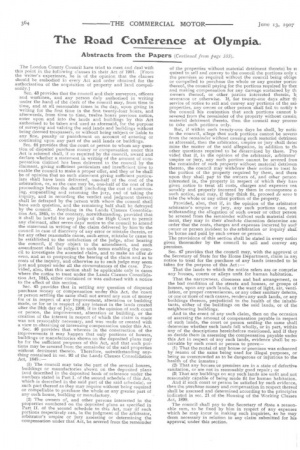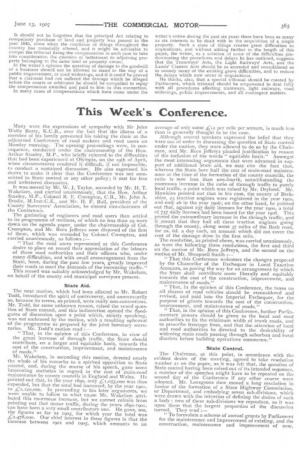The Road Conference at Olympia.
Page 6

Page 7

If you've noticed an error in this article please click here to report it so we can fix it.
Abstracts from the Papers (continued from page 355).
The London County Council have tried to meet and deal with this point in the following clauses in their Act of 1901. [From the writer's experience, he is of the opinion that the clauses should be embodied in every Act and order obtained for the authorisation of the acquisition of property and land compulsorily.] Sec. 43 provides that the council and their surveyors, officers and workmen, and any person duly authorised in writing under the hand of the clerk of the council may, from time to time, and at all reasonable times in the day, upon giving in writing for the first time in the first twenty-four hours, and afterwards, from time to time, twelve hours previous notice, enter upon and into the lands and buildings by this Act authorised to be taken and used as aforesaid, for the purpose of surveying and valuing the said lands and buildings without being deemed trespassers, or without being subject or liable to any fine, penalty or punishment on account of entering or continuing upon any part of the said lands or buildings.
Sec. 44 provides that the court or person to whom any question of disputed purchase money or compensation under this Act is referred shall, if so required by the council, award and declare whether a statement in writing of the amount of compensation claimed has been delivered to the council by the claimant, giving sufficient particulars and insufficient time to enable the council to make a proper offer, and they or he shall be of opinion that no such statement giving sufficient particulars shall have been delivered, one-half of the cost of the arbitration, or, as the case may be, one-half of the cost of the proceedings before the sheriff (including the cost of summoning, empanelling and returning the jury, and of taking the inquiry, and in recording the verdict and judgment therein) shall be defrayed by the person with whom the council shall have such question, and the remaining half shall be defrayed by the council. Anything in the Lands Clauses Consolidation Act, 1845, to the contrary, notwithstanding, provided that it shall be lawful for any judge of the High Court to permit any claimant, after seven days' notice to the council to amend the statement in writing of the claim delivered by hirn lek•the council in case of discovery of any error or mistake therein, or for any other reasonable cause, such error, mistake Or cause to be established to the satisfaction of the judge, after hearing the council, if they object to the amendment, and such amendment shall be subject to such terms enabling the council to investigate the amended claim, and to make an offer de novo, and as to postponing the hearing of the claim and as to costs of the inquiry, and otherwise as to such judge may seem just and proper under all the circumstances of the case. Provided, also, that this section shall be applicable only in cases where the notice to treat under the Lands Clauses Consolidation Act, 1845, either contained or was endorsed with a notice to the effect of this section.
Sec. 45 provides that in settling any question of disputed purchase money or compensation under this Act, the court or person settling the same shall not award any sum of money for or in respect of any improvement, alteration or building made, or for or in respect of any interest in the lands created after the 24th day of July, 1900, if in the opinion of such court or person, the improvement, alteration or building, or the creation of the interest in respect of which the claim is made was not reasonably necessary, and was made or created with a view to obtaining or increasing compensation under this Act. Sec. 46 provides that whereas in the construction of the improvements it may happen that only portions of houses, buildings or manufactories shown on the deposited plans may be for the sufficient purposes of this Act, and that such portions may be severed from the remainder of the said properties without detriment thereto. Therefore, notwithstanding anything contained in sec. 92 of the Lands Clauses Consolidation Act, 1845 :— (1) The council may take the part of the several houses, buildings or manufactories shown on the deposited plans (and described in the deposited book of reference under the numbers stated in Part I. of the second schedule of this Act, which is described in the said part of the said schedule), or such part thereof as they may require without being required or compellable to purchase the whole or any greater part of any such house, building or manufactory. • (2) The: owners of, and other persons interested in the properties numbered on the deposited plans as specified in Part II. of the second schedule to this Act, may (if such portions respectively can, in the judgment of the arbitrator, arbitrator's umpire or jury assessing or determining the compensation under that Act, be severed from the remainder of the properties without material detriment thereto) be it quired to sell and convey to the council the portions only c the premises so required without the council being oblige or compelled to purchase the whole or any greater porno: thereof, the council paying for the portions required by ther and making compensation for any damage sustained by th owners thereof, or other parties interested therein, le severance or otherwise. If, for twenty-one days after th service of notice to sell and convey any portions of the sal( properties, any owner or other person shall fail to notify t( the council his contention that such portions cannot b severed from the remainder of the property without causim material detriment thereto, then the council may proceei to take such portions only.
But, if within such twenty-one days he shall, by notic to the council, allege that such portions cannot be severe( from the remainder without causing such material detrimen as aforesaid, then the arbitrator, umpire or jury shall deter mine the matter of the said allegation, in addition to tle other questions required to be determined by them. Pro vided that if, in the opinion of the arbitrator, arbitrator' umpire or jury, any such portion cannot be severed fron the remainder of such property without material detrimen thereto, the council may withdraw their notice to treat fo the portion of the property required by them, and there upon they shall pay to the owners of, and other person: interested in, the property in respect of which they hay( given notice to treat all costs, charges and expenses rea sonably and properly incurred by them in consequence o such notice, and may, if they think fit, proceed de novo te take the whole or any other portion of the property.
Provided, also, that if, in the opinion of the arbitrator arbitrator's umpire or jury, any such portions can, not withstanding the allegation of such owner or other person be severed from the remainder without such material detri rnent, they may in their absolute discretion determine ant order that the costs, charges and expenses incurred by suck owner or person incident to the arbitration or inquiry shal: be borne and paid by such owner or person.
The provisions of this section shall be stated in every notice given thereunder by the council to sell and convey ane premises.
Sec. 47 provides that the council may, with the approval or the Secretary of State for the Home Department, claim in an notice to treat for the purchase of any lands intended to be taken for the purpose of this Act:— That the lands to which the notice refers are or comprise any houses, courts or alleys unfit for human habitation.
That the narrowness, closeness and bad arrangement, ot the bad condition of the streets and houses, or groups oi houses, upon any such lands, or the want of light, air, venti lation, or proper conveniences, or any other sanitary defects, or one or more of such causes, renders any such lands, or any buildings thereon, prejudicial to the health of the inhabitants, either of the buildings on the said lands, or of the neighbouring buildings.
And in the event of any such claim, then on the occasion of assessing the amount of compensation payable in respect of such lands, the court or person settling the same shall determine whether such lands fall wholly, or in part, within any of the descriptions hereinbefore mentioned, and if they
an decide them in assessing the compensation payable under this Act in respect of any such lands, evidence shall be receivable by such court or person to prove—
(1) That the rental of any house or premises was enhanced by reason of the same being used for illegal purposes, or being so overcrowded as to be dangerous or injurious to the health of the inmates ; (2) That any houses or premises are in a state of defective sanitation, or are not in reasonably good repair ; or (3) That any buildings on any such lands are unfit and not reasonably capable of being made fit for human habitation.
And if such court or person be satisfied by such evidence, then the purchase money and compensation in respect thereof shall be assessed and determined according to the principles indicated in sec. 21 of the Housing of the Working Classes Act, 1890.
The council shall pay to the Secretary of State a reasonable sum, to be fixed by him in respect of any expenses which he may incur in making such inquiries, as he may deem necessary in relation to any claim submitted for his approval under this section. It should not be forgotten that the principal Act relating to compulsory purchase of land and property was passed in the year 1845, since when the condition of things throughout the country has materially altered, and it might be advisable to compel the tribunal fixing the compensation in each case to take into consideration the question of betterment to adjoining property belonging to the same land or property owner.
In the writer's opinion the question of damage to the goodwill of a business should not be allowed to stand in the way of a public improvement, or road widenings, and if it could be proved that a claimant had not suffered the damage which he alleged before the courts or arbitrator he should be compelled to repay the compensation awarded and paid to him in this connection.
In many cases of compensations which have come under the
writer's notice during the past six years there have been as many as six interests to be dealt with in the acquisition of a single property. Such a state of things creates great difficulties in acquisitions, and without adding further to the length of this paper, the writer, as a solution of some of the difficulties predominating the procedures and delays he has outlined, suggests that the Tramways' Acts, the Light Railways' Acts, and the Lands' Clauses Acts should be so amended and consolidated as to remedy many of the existing grave difficulties, and to reduce the delays which now occur in acquisitions.
He thinks, also, that a special tribunal should be created by Parliament, which tribunal should he empowered to deal fully with all procedures affecting tramways, light railways, road widenings, public improvements, and all contingent matters.






















